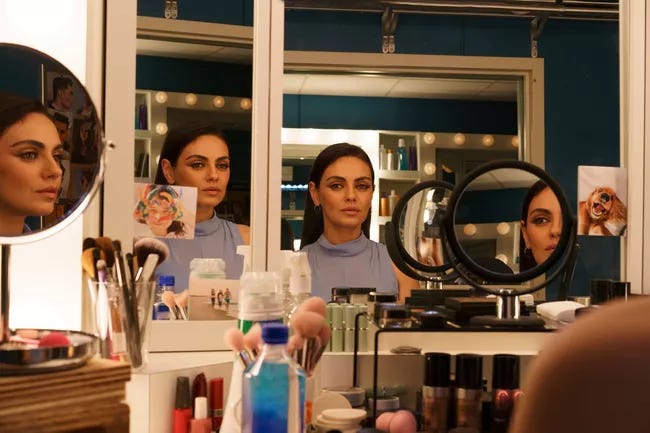Luckiest Girl Alive
Mila Kunis-led bestseller adaptation has massive tonal shifts, but could possibly uplift.
Film Yap is a reader-supported publication. To receive new posts and support my work please consider becoming a free or paid subscriber.
“Luckiest Girl Alive” (now streaming on Netflix) is an adaptation of Jessica Knoll’s best-selling book, which she herself adapted to the screen. Despite being published in 2015, this story somehow presciently includes elements of two of 2018’s biggest news stories into its narrative – those being the mass shooting at Marjory Stoneman Douglas High School in Parkland, Fla. and Dr. Christine Blasey Ford’s testimony against Supreme Court Justice Brett Kavanaugh before the Senate Judiciary Committee. Throw in a dash of “Sex and the City” and a splash of Gillian Flynn’s work and you’ve got a good idea at the overarching vibe of “LGA.”
Mila Kunis stars Ani Fanelli, a New York-based sex columnist for a women’s magazine. She has the admiration of her editor Lolo Vincent (Jennifer Beals – does this woman ever age?), the fierce loyalty of college friend Nell Rutherford (prestige television veteran Justine Lupe) and the family heirloom ring of her lacrosse-playing, hedge fund-managing, Nantucket golden boy fiancé Luke Harrison (Finn Wittrock, convincingly conveying trust fund privilege at every turn). Ani’s life appears to be perfect – including Williams Sonoma shopping sprees and a Cartier watch on her wrist – but these material trappings mask past trauma.
We flashback to 1999 and the time young Ani (played by Chiara Aurelia) spent at a prestigious East Coast prep school. She’s a scholarship student, but quickly becomes a member of the in-crowd. Ani begins dating the popular Liam Ross (Isaac Kragten) and hanging with his fashionable friends Dean Barton (Alex Barone), Peyton Powell (Gage Munroe) and Hilary Hutchinson (Alexandra Beaton). In spite of her newfound popularity, Ani still spends time with outcasts Arthur Finnerman (Thomas Barbusca) and Ben Hunter (David Webster). Unfortunately, Arthur and Ben have been bullied by Liam, Dean and Peyton. Two tragedies strike in rapid succession and Ani, in part, is blamed for both – marking her as a social pariah at the private school.
“LGA” is directed by British filmmaker Mike Barker, who helmed the late 1990s Alessandro Nivola, Reese Witherspoon and Josh Brolin-fronted crime thriller “Best Laid Plans” and has moved onto television work in recent years on shows such as “Outlander,” “Fargo,” “The Handmaid’s Tale” and “The Sandman.” He’s made a handsome and well-acted albeit slightly confused movie with “LGA.” Tonal shifts may give audiences whiplash at times – what begins as a frothy, dark comedy quickly devolves into something decidedly darker. Graphic depictions of rape and a school shooting could and should rattle audiences and may be deemed distasteful.
I did greatly admire the performances of Kunis and Aurelia playing Ani at different ages. Kunis, whom I’ve found completely charming in romantic comedies such as “Forgetting Sarah Marshall” and “Friends with Benefits,” proves once again after “Black Swan” to be a strong dramatic actress when given the opportunity. She sells a survivor’s strength with great aplomb. I’m not as familiar with Auerlia, who’s a bit of a Netflix staple having appeared in “Gerald’s Game” and “Fear Street: Part II – 1978,” but she sensitively portrays young Ani’s longing for acceptance and mourning for lost innocence. These actresses are strongly supported by Connie Britton as Ani’s despicable mother Dina and Scoot McNairy as Andrew Larson, a supportive teacher at Ani’s school with whom she has a chance encounter later in life.
Despite any issues I might’ve had with “LGA,” it’s ultimately a powerful #MeToo-tinged tale of one woman’s struggle for self-acceptance, self-actualization and self-improvement. I could see it empowering other survivors and assisting them in living their truth. There’s value in this.





